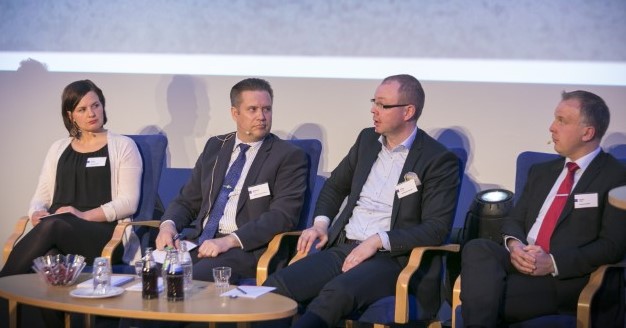Sami Sulkko (Mayor of Forssa), Timo Koivisto (Mayor of Jyväskylä) and Kimmo Jarva (Mayor of Lappeenranta) with Elina Rantanen (the second vice-chair of Turku City Council) presenting their respective cities’ resource wisdom road maps in Jyväskylä on 2 June 2015.
During the spring of 2015, with Sitra’s support, the towns of Forssa, Lappeenranta and Turku drew up their own resource wisdom road maps, outlining long-term sustainable well-being targets and the measures required for achieving them. The road maps show what the regions must do to create sustainable cities based on aspects such as energy production and consumption, and community structure. The cities also committed themselves to creating operating models for saving on natural resources, reducing emissions and enhancing the well-being of local residents.
Road map creation forms part of the operating model – developed by Sitra and the City of Jyväskylä through a joint project between 2013 and 2015 – for resource-wise cities. As part of becoming resource wise, the cities aim to be carbon neutral and waste free, while keeping their use of natural resources within the earth’s carrying capacity, by 2050 at the latest. The operating model combines all city projects on sustainable development to form a cohesive whole, creating a shared objective and the related road map for city regions.
Road maps were drawn up for Forssa, Lappeenranta and Turku in cross-community workshops between March and May. This work brought experts from various sectors together to form a working group comprising representatives of the city, the private sector, educational institutions and resident associations. In its work, the road map group aimed to make goal-setting a motivating and ambitious process that makes use of the participants’ local knowledge and expertise. The road map group also functions as an ambassador of resource wisdom.
Those invited to the road map group convened for the first time at a briefing event, Vitality from Resource Wisdom, held in March, where work based on the resource wisdom operating model, road map work and methods to be employed in workshops were introduced. The city representatives also gave presentations on other programmes and development projects related to the theme. The participants also brainstormed on the preliminary contents of the road map and its “motorway lanes”.
After the briefing events, the first workshops were held. In these, the group members refined the contents of the road map’s various sub-areas, based on the resource wisdom indicator values calculated for each city. In addition, a clear vision was formed of the overall objective and the required interim steps. Around a month later, the second set of workshops involved the further elaboration of the overall objective, the selection of spearhead measures and the assignment of preliminary schedules and the parties responsible. In addition, resource wisdom road maps were created for each city (see the road maps at the end of this text).
At the end of each workshop, a small panel comprising municipal, business life and educational management representatives was present to assess the results achieved by, and to spar with, the working group. The panel helped the working group with road map creation by giving feedback, making comments and presenting its views to ensure that the right elements were included. The goal is to make the most extensive possible use of the competencies, networks and resources of the various regional actors when implementing the road map.
Pointing the way towards implementation
Each resource wisdom road map consists of five thematic areas with complementary goals and measures. The resource wisdom road maps of Forssa, Lappeenranta and Turku were presented at the event New Vitality for City Regions through Resource Wisdom in Jyväskylä on 2 June.
The cities will continue their resource wisdom work independently. They can refine their road maps, which are intended as documents for further updating and development. The next phase will be implementation, i.e. embedding the resource wisdom targets in the municipality’s operations. Each municipality will assign resource wisdom spearhead projects as part of implementation. Common indicators and comparison data will be used to follow the progress of each city towards zero waste and carbon neutrality.
In the future, the FISU Network’s (or Finnish Sustainable Communities) service centre, operated by Motiva Oy and the Finnish Environment Institute (SYKE), will provide the cities with expert assistance. The initial members of the network, established at the beginning of this summer are Forssa, Jyväskylä, Lappeenranta and Turku. The FISU Network municipalities offer each other peer support by, for example, sharing information on best practices. New cities and municipalities are welcome to join the network in the future.
See the resource wisdom road maps below:




Recommended